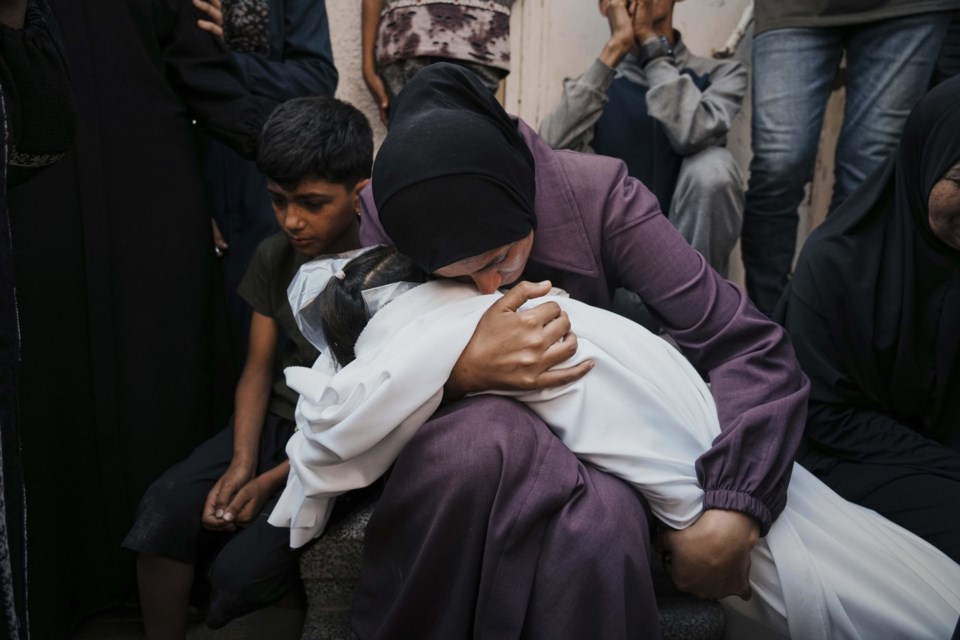UNITED NATIONS (AP) — The United States on Wednesday vetoed a U.N. Security Council resolution demanding an immediate and permanent ceasefire in Gaza because it was not linked to the release of hostages.
The resolution before the U.N.'s most powerful body also did not condemn Hamas’ deadly attack in Israel on Oct. 7, 2023, which ignited the war, or say the militant group must disarm and withdraw from Gaza — two other U.S. demands.
The 14 other members of the 15-nation council voted in favor of the resolution, which described the humanitarian situation in Gaza as “catastrophic” and called on Israel to lift all restrictions on the delivery of aid to the 2.1 million Palestinians in the territory.
Acting U.S. Ambassador Dorothy Shea, speaking to the council immediately before the vote, said the resolution would undermine the security of Israel. a close U.S. ally, and diplomatic efforts to reach a ceasefire “that reflects the realities on the ground," while emboldening Hamas.
The Palestinian U.N. Ambassador Riyad Mansour has said that supporters plan to go to the 193-member U.N. General Assembly next week with a similar resolution focused on the dire humanitarian situation in Gaza. There are no vetoes in the General Assembly. Unlike in the Security Council, its resolutions are not legally binding, but instead are seen as a measure of world opinion.
Pakistan's Ambassador Asim Iftikhar Ahmad condemned the U.S. veto: "It will be remembered as a complicity, a green light for continued annihilation. A moment where the entire world was expecting action. But yet again, this council was blocked and prevented by one member from carrying out its responsibility.”
The U.S. vetoed the last Security Council resolution on Gaza in November, under the Biden administration, also because the ceasefire demand was not directly linked to the immediate and unconditional release of all hostages. Similarly, the current resolution demands those taken by Hamas and other groups be released, but it does not make it a condition for a truce.
President Donald Trump's administration has tried to ramp up its efforts to broker peace in Gaza after 20 months of war. However, Hamas has sought amendments to a U.S. proposal that special envoy Steve Witkoff has called “totally unacceptable.”
The vote followed a decision by an Israeli and U.S.-backed foundation to pause food delivery at its three distribution sites in the Gaza Strip after health officials said dozens of Palestinians were killed in a series of shootings near the sites this week. Israel and the United States say they supported the establishment of the new aid system to prevent Hamas from stealing aid previously distributed by the U.N.
The United Nations has rejected the new system, saying it doesn’t address Gaza’s mounting hunger crisis, allows Israel to use aid as a weapon and doesn’t comply with the humanitarian principles of neutrality, impartiality and independence. The U.N. says its distribution system throughout Gaza worked very well during the March ceasefire and is carefully monitored.
The resolution demanded the restoration of all essential humanitarian services in line with humanitarian principles, international humanitarian law and U.N. Security Council resolutions.
Gaza’s roughly 2 million people are almost completely reliant on international aid because Israel’s offensive has destroyed nearly all food production capabilities. Israel imposed a blockade on supplies into Gaza on March 2, and limited aid began to enter again late last month after pressure from allies and warnings of famine.
“The world is watching, day after day, horrifying scenes of Palestinians being shot, wounded or killed in Gaza while simply trying to eat,” U.N. humanitarian chief Tom Fletcher said in a statement Wednesday. He called for a flood of aid to be let in and for the world body to be the one delivering it.
The Security Council has voted on 14 Gaza-related resolutions and approved four since the war began. That is when Hamas-led militants stormed into southern Israel on Oct. 7, 2023, killing around 1,200 people, mostly civilians, and abducting 251.
They are still holding 58 hostages, a third of them believed to be alive, after most of the rest were released in ceasefire agreements or other deals.
Israel’s military campaign has killed more than 54,000 Palestinians, mostly women and children, according to Gaza’s Health Ministry, which doesn’t say how many of the dead were civilians or combatants.
The ministry is led by medical professionals but reports to the Hamas-run government. Its toll is seen as generally reliable by U.N. agencies and independent experts, though Israel has challenged its numbers.
___
AP writer Farnoush Amiri at the United Nations contributed to this report.
Edith M. Lederer, The Associated Press



